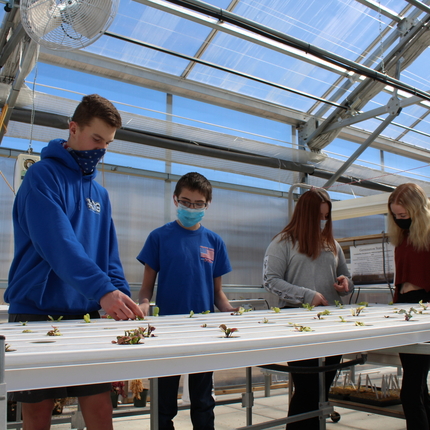By Justin Carter and Nathan Beacom, former staff members
School districts and organizations across Nebraska are putting a renewed emphasis on food—not only which food students eat, but where it comes from and what the students know about it.
Farm to school is a growing phenomenon throughout our schools. What was once a novel idea that involved perhaps one local ingredient served in the cafeteria per month is evolving into a statewide movement. Farm to school encompasses programs that work to increase local food procurement for the cafeteria while educating students on nutrition and agriculture through fun, experiential learning.
In late 2020, state Sen. Tom Brandt of Legislative District 32 organized a task force of Nebraskans working in these programs to research the state of farm to school in Nebraska. Their work produced Legislative Resolution (LR 337), which detailed current farm to school work in the state along with recommendations on expanding that work.
The report found 29% of Nebraska schools have taken part in farm to school activities. Much of this has been in the form of the procurement of local food through broadline distributors, but also through local farms and processors, as well as school gardens and greenhouses. It also found that when local foods were introduced to students, the consumption of fresh fruit and vegetables rose from less than 1 to 1.3 servings daily.
On the education side, the report found that students participating in gardening or farming as part of an academic curriculum gained an increased knowledge of STEM concepts, increased physical activity, and reduced phobias of unfamiliar foods.
The nutritional and educational benefits of farm to school are often obvious. At the same, it’s a great economic development tool. LR 337 found that each dollar invested in farm to school stimulates an additional $0.60 to $2.16 in local economic activity. Procurement programs can create long-term revenue streams for farmers looking to expand their markets. Furthermore, these growers may sell products to schools to which they are contributing through property taxes.
Countless opportunities are embedded in farm to school, however limitations still exist. School food service directors must often sift through heavy regulations surrounding local food procurement. This can be especially taxing when they are already experiencing budget constraints and busy planning menus. Local producers and processors often struggle to realize or meet school needs regarding costs, quantity, packaging, and farm food safety requirements. In addition, state agriculture education curricula is a patchwork of individual programs with separate goals and lesson plans. A lack of state direction around agricultural education can leave instructors scrambling to find resources.
The policy recommendations detailed in LR 337 have given way to the introduction of Legislative Bill 396. The Nebraska Farm to School Program Act, also introduced by Sen. Brandt, would establish a Nebraska Farm to School Program to be administered by the state Department of Education. Importantly, this program would provide the leadership of a state coordinator on farm to school. Among other things, this position could provide links between schools and farmers to ease the process of local food procurement. Those links could help schools create hands-on learning opportunities for students, such as school gardening, cooking demonstrations, and farm visits. And, they would help communities establish farm to school plans and partnerships across the state, plus provide workshops and training on farm to school topics.
With established state leadership, farm to school could grow at a consistent pace throughout Nebraska. This type of program could turn Nebraska from a state with notable farm to school examples to a nationwide leader.
Feature photo: Students at North Bend Central in North Bend, Nebraska, tend to vegetables planted in their school greenhouse. | Photo by Rhea Landholm





